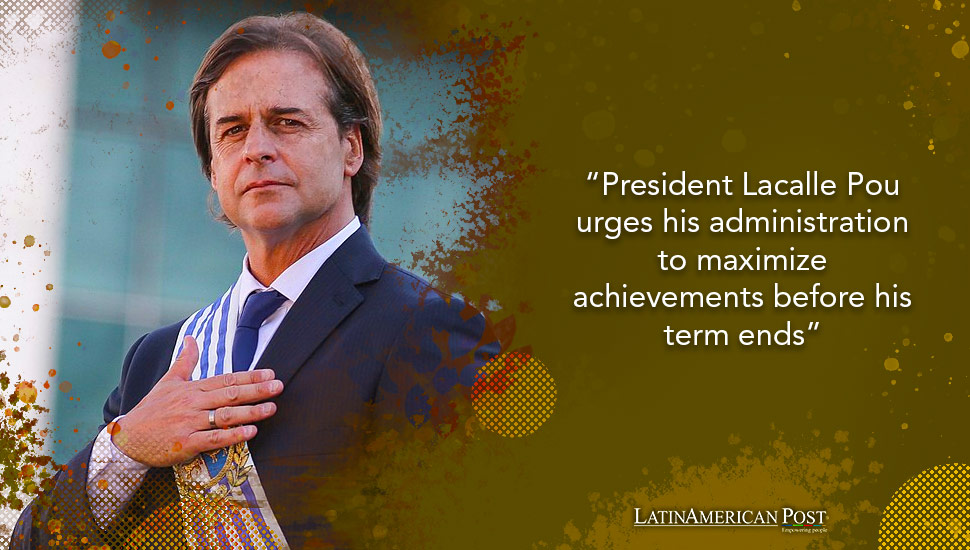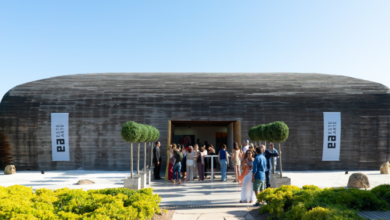Uruguay’s Push for Progress in Lacalle Pou’s Final Year

President Lacalle Pou urges his administration to maximize achievements before his term ends, emphasizing security, housing, and technological innovation.
With President Luis Lacalle Pou’s term set to conclude in March 2025, he has issued a compelling call to his cabinet and the heads of public enterprises. This urgent directive, delivered with a sense of immediacy, underscores the importance of maximizing achievements before the upcoming national elections in October, thereby solidifying his administration’s legacy.
On Tuesday, Lacalle Pou convened an extended cabinet meeting at the Torre Ejecutiva, bringing together ministers, vice-ministers, and leaders of autonomous public enterprises. The focus was clear: intensify efforts to deliver on critical objectives before the mandate concludes.
After the meeting, Pablo Da Silveira, Uruguay’s Minister of Education and Culture, conveyed the president’s message to the press. He emphasized Lacalle Pou’s commitment to continuing work on critical projects, even as the nation gears up for elections. “The president reiterated his previous call from December 2023 for authorities to strive for the highest number of achievements,” Da Silveira noted.
Achievements and Goals
The session was marked by comprehensive participation, with an initial lengthy address from Lacalle Pou and numerous inputs from other ministers and directors of autonomous bodies. According to Da Silveira, discussions spanned various sectors, emphasizing security, housing, and Uruguay’s incorporation into the Budapest Treaty on patents.
Security and housing have been prominent issues throughout Lacalle Pou’s presidency. The government has implemented measures to reduce crime and improve public safety, although these efforts have met with varying degrees of success. Housing projects have also been a key focus, particularly those targeting low-income families. As the administration enters its final phase, ensuring the continuation and completion of these initiatives is paramount.
The Budapest Treaty
A notable topic during the cabinet meeting was the recent approval by the House of Representatives for Uruguay to join the Budapest Treaty on the International Recognition of the Deposit of Microorganisms for Patent Procedure. Da Silveira described this as “an old debt” and highlighted its importance for Uruguay’s future.
“Joining the treaty is a significant step,” Da Silveira remarked. “It was contradictory for us to claim a commitment to knowledge and a high-quality workforce while remaining outside an agreement embraced by most of the world.” The treaty’s ratification by the Senate is anticipated to boost technological investments and benefit those in the science and technology sectors.
Uruguay’s push for progress is not just a national endeavor, but a significant development within the broader Latin American context. As the region grapples with political shifts, economic challenges, and social unrest, Uruguay stands out as a beacon of stability and progressive regional policies. President Lacalle Pou’s leadership is instrumental in maintaining and building on this reputation, as he steers the country towards a future marked by security, housing, and technological innovation.
Latin American history is marked by periods of instability and resilience. Countries like Argentina, Brazil, and Mexico have faced similar challenges balancing economic growth with social equity. Uruguay, often seen as a beacon of stability and progressive regional policies, aims to maintain and build on this reputation under Lacalle Pou’s leadership.
Economic and Technological Advancements
Uruguay’s strategic push into technological innovation aligns with broader trends in Latin America, where countries increasingly focus on digital transformation and knowledge-based economies. The region has seen a surge in tech startups and investments in digital infrastructure, driven by a young, tech-savvy population and growing internet penetration.
By incorporating the Budapest Treaty, Uruguay is taking a significant step towards strengthening its position in the evolving technological landscape. This move is not just about attracting more technological investments, but about fostering a vibrant ecosystem for research and development, thereby paving the way for a brighter, more innovative future.
The upcoming elections add a layer of complexity to Uruguay’s political dynamics. Lacalle Pou’s administration must balance achieving tangible results with maintaining public trust and support. The government’s focus on security, housing, and technological advancement reflects a strategic effort to address pressing issues while positioning Uruguay as a forward-thinking nation.
The emphasis on technological innovation, in particular, resonates with the aspirations of younger generations who seek opportunities in emerging sectors. This focus also aligns with global trends towards sustainable development and digital transformation, positioning Uruguay as a competitive player on the international stage.
The Path Forward
As Uruguay navigates the final year of Lacalle Pou’s presidency, the government’s proactive stance on critical issues is crucial for maintaining momentum and ensuring a smooth transition. The call for achieving significant milestones underscores the administration’s commitment to delivering on its promises and leaving a lasting impact.
Public awareness and engagement will be vital in this process. Effective communication of the government’s achievements and plans can help build public confidence and foster a sense of collective purpose. Collaboration with civil society, industry stakeholders, and international partners will drive progress.
Uruguay is pivotal as President Luis Lacalle Pou urges his administration to maximize achievements before his term ends. The focus on security, housing, and technological innovation reflects a strategic vision for the country’s future. Uruguay aims to strengthen its position as a stable, progressive, and innovative nation in Latin America by addressing these critical issues.
The broader context of Latin American history and current socio-political dynamics underscores the significance of this moment. As Uruguay prepares for the upcoming elections, the government’s efforts to achieve tangible results will be crucial for maintaining public trust and driving sustainable development.
Also read: Uruguay’s United Battle Against Misinformation is an Example to Follow
Uruguay’s commitment to knowledge, innovation, and social equity sets a powerful example for the region. The country’s proactive stance on issues like the Budapest Treaty highlights its ambition to lead in technological advancement and global collaboration. As the administration works towards its goals, the region and the world will closely watch Uruguay’s path forward.





